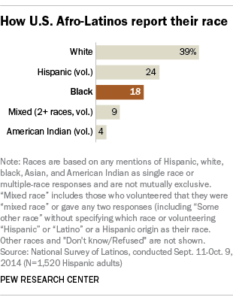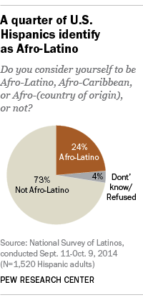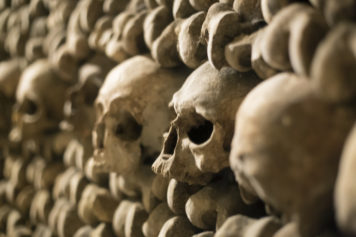
Getty Images
A Pew Research Center survey on Afro-Latinos in the U.S. is revealing, causing us to delve deeper into a complex case of racial and ethnic identity in the Black diaspora, and the divide — even confusion — facing Latinos of African descent.
The Pew survey found that 24 percent of Latinos in the U.S. identify as Afro-Latino, Afro-Caribbean or of African descent with roots in Latin America. Meanwhile, only 18 percent of Afro-Latinos identify as Black. Actually, more people from this group said they were white — 39 percent — or Hispanic — 24 percent — with 9 percent saying they are mixed race.
This marks the first time that Afro-Latinos have been the focus of a national study.

Further reflecting the intricacies of racial identity among Latinos, two-thirds of Latinos (67 percent) say their Hispanic background is a part of their racial background. In contrast, the U.S. Census Bureau classifies Hispanic identity as an ethnic group as opposed to a racial group.
Afro-Latinos are a substantial part of Latin American countries such as Brazil, the Dominican Republic and Cuba. Many Latin American nations had not collected data on the ethnicity or racial makeup of their populations, but that is changing, with Mexico as an example of recent efforts to recognize the Black people in their midst.
The multiple dimensions of Hispanic identity also reflect the long colonial history of Latin America, during which mixing occurred among indigenous Americans, white Europeans, slaves from Africa and Asians. In Latin America’s colonial period, about 15 times as many African slaves were taken to Spanish and Portuguese colonies than to the U.S. Today, about 130 million people of African descent live in Latin America, making up roughly a quarter of the total population, according to estimates from the Project on Ethnicity and Race in Latin America at Princeton University.
The legacy of racism and colonialism in Latin America has caused people of African descent to shun dark skin and African features. The Spanish term adelantar la raza, or “advance the race” refers to the notion that one should marry someone with a lighter complexion than himself or herself. Further, in the U.S. there is the popular media stereotype of a Latino “look” that is typically lighter skinned and does not include African features. In the process, Afro-Latinos become invisible and struggle with who they are, unable to claim their Black and Latino roots, their identity questioned and scrutinized by Latinos, other Black people and whites as well.
“I walk down the street and people assume I am a Black man and nothing more,” Afro-Latino Marco Davis told NBC News. “The story of the Afro-Latinos is a chapter in our society that hasn’t been well written. It’s a story that still needs to be told. We are of both worlds. It’s not either or, and people don’t get that.”
“As an Afro-Latina I get to claim, not only from my African-American side, but from my Afro-Latina side because all of my people came, in one way or another, from the continent of Africa,” said Leah Hairston, an Afro-Latina student at Columbia University School of Social Work, to NBC News. “Our Blackness is often demeaned in [Latino] culture. You don’t really want to have Black roots or you don’t want to embrace what it means to be ‘African-anything’ because [of] the history of systemic oppression.
“Oppressed people should come together to recognize beauty and excellence in all part of their heritage,” Hairston said. “Afro-Latinos are not a bridge between African-Americans and Latinos, but they’re equally important and should be celebrated as such.”
Hairston said it is important not to whitewash Latino history, but rather to the acknowledge the Blackness, and to realize there is no singular Afro-Latino identity, but rather that there are Afro-Dominicans, Afro-Colombians, Afro-Cubans, Afro-Peruvians and others.
Ultimately, at issue here is which ports Africans were dropped off after that grueling journey through the Middle Passage. And that really is no issue at all, as people of African descent share the same origins and face the same struggles and challenges wherever they are. At a time of a growing sense of pride among people of African descent, Afro-Latino people have a chance to come into their own.
 The multiple dimensions of Hispanic identity also reflect the long colonial history of Latin America, during which mixing occurred among indigenous Americans, white Europeans, slaves from Africa and Asians. In Latin America’s colonial period, about 15 times as many African slaves were taken to Spanish and Portuguese colonies than to the U.S. Today, about 130 million people of African descent live in Latin America, making up roughly a quarter of the total population, according to estimates from the Project on Ethnicity and Race in Latin America at Princeton University.
The multiple dimensions of Hispanic identity also reflect the long colonial history of Latin America, during which mixing occurred among indigenous Americans, white Europeans, slaves from Africa and Asians. In Latin America’s colonial period, about 15 times as many African slaves were taken to Spanish and Portuguese colonies than to the U.S. Today, about 130 million people of African descent live in Latin America, making up roughly a quarter of the total population, according to estimates from the Project on Ethnicity and Race in Latin America at Princeton University.

